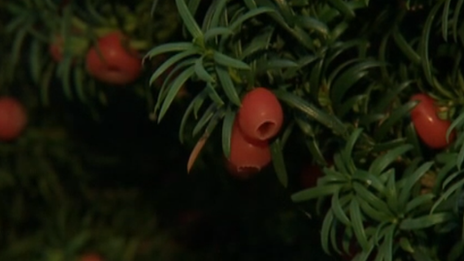Ben Hines died after ingesting yew tree poison
- Published
An "intelligent and happy" young man died of poisoning from yew trees, an inquest in Norwich has heard.
Ben Hines, 31, collapsed at home in Brockdish, Norfolk, on 21 August last year after gardening.
The inquest heard he died of taxine alkaloid ingestion, which is associated with yew needles and berries.
Assistant coroner David Osborne said there was no evidence of suicide and that it was not known how Mr Hines came to ingest the poison.
Played his guitar
His mother Teresa Hines told the hearing that the day before he died, Mr Hines had been working on a pond in the garden.

It was not known how Ben Hines ingested the poison, the inquest heard
"Prior to that, he had been working on friends' ponds. He was putting plants into the pond," she said.
"I think it's possible there were yew trees surrounding the pond."
Miss Hines said that evening, her son was his "normal self" and went out to play his guitar at a local venue.
The following evening, she said, she got a phone call to say Mr Hines had collapsed.
Treated for depression
"I rushed round and found him lying on the floor," she said.
Miss Hines said her son was in and out of consciousness and kept trying to get up.
She dialled 999 and gave him cardiopulmonary resuscitation until paramedics arrived and took over.
He was taken to the Norfolk and Norwich University Hospital but pronounced dead shortly after arriving.
A toxicology report indicated it was "highly unlikely" that poisoning could have resulted from anything other than oral ingestion.
The inquest heard that Mr Hines had been treated for depression from 2011 but there were no reports of suicidal thoughts.
'A good guy'
Miss Hines said: "He was quite a quiet young man; very intelligent; happy; good sense of humour.
"He was very concerned and cared for people around him and the wider world."
She said he was due to begin a teaching job in October and agreed he had "everything to look forward to".
On his death, one of Mr Hines' friends said: "The world has lost one of its good guys," the inquest heard.
Recording a narrative conclusion, Mr Osborne said there was no evidence that the ingestion of the poison had been intentional.
"On that basis, there's no question of me considering that Ben may have killed himself," he said.
- Published26 December 2011